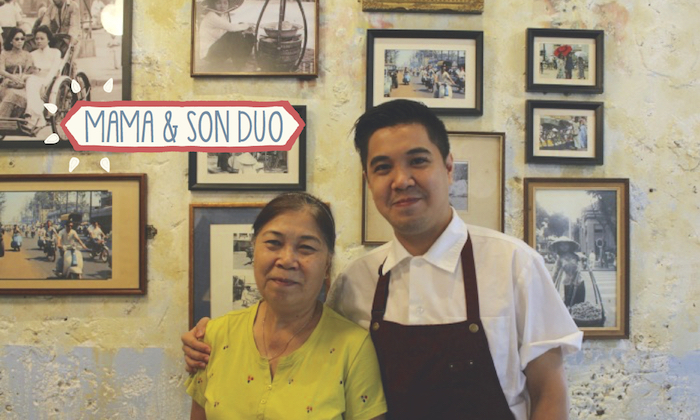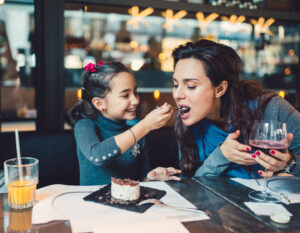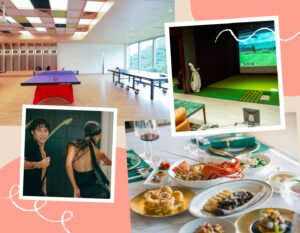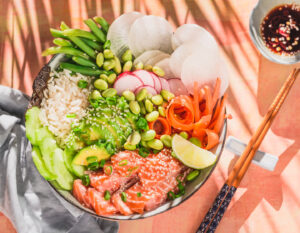

We sit down with Head Chef of Le Garçon Saigon, Chef Bao and his culinary genius mama, as they dish (pun intended!) about their love of food and family…
The saying, “I got it from my mama” couldn’t be more true when it comes to the case of this mother and son duo. Chef Bao Le and his mum, Chieu Thi Le met us at Black Sheep Restaurants Saigonese restaurant, Le Garçon Saigon for a chat. Instantly, we could feel their connection while their mutual love for one another and their craft was undeniable. Inspired by his mum and dad’s hard work as new immigrants to Australia and subsequent success with their Vietnamese restaurant, Kim Thanh in Brisbane, Chef Bao shares his culinary journey to Hong Kong. And as he shared, there was a real sense of appreciation, gratefulness and reverence for his mum. Through Chef Bao’s mum unending encouragement and support, Hong Kong has gained a great chef. Never under estimate the power of a mama!
Tell us a little bit about yourselves. How did you end up in Hong Kong?
Bao: I’m an Australian kid, born in Australia to immigrant parents. I basically grew up in my parents kitchen, because they opened it when I was one. I’ve lived and breathed restaurants from the beginning as I’ve always had a passion for cooking, but because I saw the hardships of what my parents went through (owning their own business) I decided to take a different path. I went to university, got my commerce degree, worked in accounting, and then realised it just wasn’t for me. The pay was great, absolutely, but money isn’t everything. So I asked my mum if I could leave accounting, and she was so supportive. She came to Australia with nothing, so she knows that anything is possible, even a successful career as a chef…
Chieu Thi Le: … You have to do what makes you happy.
B: So I quit my job, and went to work for mum and dad full time. Mum ran the kitchen, while dad worked on the front of house. 25 years later, they were ready to either sell their popular restaurant or turn it over to me. I insisted that it was now their opportunity to enjoy life, so they sold the restaurant and I became unemployed.
Thankfully, I networked a lot when I was still working, so really quickly Dan Hong and Jowett Yu approached me to cook in Sydney and soon they became my mentors whom I learned a lot from. I’m first generation Australian Vietnamese, and I want to cook the food how it was originally made, and from those guys I learned I could still do that AND add my own touch to the dishes.
A few years later, Jow called me up, he was opening a restaurant in Hong Kong with Black Sheep Restaurants, and he wanted me to be his sous chef. I didn’t know much about Hong Kong food, but I loved eating it, so I knew I could put my heart into it. He told me to just come for a week or two, and I never left. I’ve been in Hong Kong ever since. There’s a lot of opportunity here… it’s an international hub.


What inspired mum to start cooking, and in turn, inspired Bao?
C: I went to Australia in 1981, it was during Chinese New Year, my first son was two years old and two months, and my husband and I were each working two or three jobs. In 1985, I had Bao. I loved to cook, I was always cooking back in Vietnam. One day, my husband found this space, and even though we didn’t have any money, we took it. They let us use the space with no deposit! We took it over in 1986, and while we worked in the restaurant the boys played outside. Our restaurant started very quiet, but then became very, very busy. I had to give my family up for it. I only saw Bao one night a week—
B: — I stayed with a babysitter, and would come home on Sunday for the first few years.
C: — I worked day and night, so I couldn’t take care of a baby. I only worked, ate and slept. It just kept going, and kept getting busier and busier. As the boys grew, they were able to help me in the kitchen, and it became a family business. My husband ran the front, and the rest of us were in the kitchen. And the boys kept helping us—
B: — English isn’t mum and dad’s first language, so I had to get involved with the business side, helping them take care of admin and paperwork, and all of these forms—
C:— I am very lucky with my two sons, they are good boys. The whole family is good. Bao and I always talk and talk, and I know he is good in Hong Kong. He loves Hong Kong, and he loves cooking. Yes, I miss him so much, but his future is now, and it is here. He has grown up and he needs to do what he loves. I can only support him, and help him to be happy. I’m so proud of him, I give him anything I can to help him. We have a very lucky family, we’re very happy.


In what ways are cooking as a mama-and-son team helpful? What are the pros and cons? Any funny stories?
B: For me, cooking is all about measurements. When I see mum do it though, she just throws things in. She’s not measuring anything. It’s all about feeling, and her dishes always taste the same. It’s fascinating! I still can’t do that.
C: We [my generation] learned by tasting, but now Bao is teaching me, and making me better.
B: There’s no bad drama, though it is always heated in the kitchen. Especially during service, and especially with family. When she’s here now, she just keeps an eye on everyone, and keeps things smooth.
C: We’re lucky, we came with nothing and we learned a lot. We learned a lot from our customers, especially English. When we came to Australia, we didn’t have the language, but my husband said if we talk more we can learn more.
B: Oh, there is one funny story! We had a lot of policemen coming through the restaurant as regulars, and they became quite close with mum and dad. One time, when the family was going through boarder security, we got stopped and they were giving mum a really hard time, until she pulled out a stack of police cards from her wallet and they quickly let her through!


What dishes remind you of home? Do any of the dishes have a special story to them?
B: Vietnamese soup, it’s the best. Bún bò huê’, it’s the best soup of all time. It’s a beef and pork broth, with a lot of depth. It’s got lemongrass, shrimp paste, chilli paste; it’s got everything. When people think of Vietnamese soup they think of pho, but there’s a soup that’s 10,000,000 times better than that, but it takes a lot of time, and a lot of love. You get it when you taste it.
C: When we first started, customers didn’t like our food. They only wanted sweet and sour pork. Now, they love it and they eat it all the time—
B: — when mum introduced fresh, Saigonese food, no one understood the food. They thought the rice paper rolls were raw, and wanted to send it back to the kitchen. But then they got it, and it became so popular. We’d be rolling literally hundreds of spring rolls for events.
If Bao was to cook a special meal for Mum, what would it be and why?
B: Every time I go home, I cook the food from the restaurant I’m working at. I do a lot of barbecue, and I love to show mum new skills—it develops her as a chef too, and she gets introduced to new flavours and techniques. We share a lot, you can learn a lot when you travel through a place’s food. I don’t tend to cook her Vietnamese food though, because she’s a living legend.


What is the one dish you have to get at Le Garçon Saigon?
B: The Bavette Steak, I have to say. I was actually really reluctant to even put it on the menu. I wanted to create a really beefy steak I had in San Sebastian, it was so meaty! But no one wanted it [laughs] and you have to cater to what people want. Our steak takes about an hour to do, and because it’s slowly grilled- it takes a lot of love and effort. The result is really melt in your mouth. I like it in a rice paper roll—because I like anything in a rice paper—but it’s so good you can just eat it by itself. It’s not a dish a Vietnamese person would do, because it’s cooked medium rare, and that would never happen in Vietnam, but the flavours are all there. The Vietnamese sauce, with fish sauce. The dish is all Vietnamese flavours, done in a Vietnamese style, and that’s what it’s all about: cooking food your own way, and still representing the best of the cuisine. I just want to give Hong Kong the best Vietnamese food, actually not “Vietnamese food”, but Saigonese food.
What are your must have ingredients that we’ll find in your fridge?
B: Fish sauce, it’s so versatile and soy sauce goes on everything. I love Chinese veg, especially gai lan but never bok choy, it’s just too watery. I love sauces, they’re the foundations that let you do other things. I hate plain food, I need taste, and lots of flavour. I have to have rice paper too, but that’s in the cupboard. I can sit there and eat a whole pack of it just plain.
How has life in HK Influenced your cooking styles?
B: There are a few dishes on the menu here, that are a result of skills I learned at other restaurants, like Ho Lee Fook, especially the roast duck. But it’s only on the menu because I had a great roast duck in Vietnam recently, and I wanted to recreate it.


You recently hosted an event at Le Garçon Saigon raising money for an organisation that’s close to your heart. Tell us more about Koto.
B: Koto is a non-for-profit. They train disadvantage youths to work in hospitality, giving them life skills. With those skills, they can go somewhere, and become something – even if it’s not in hospitality. A lot of these kids can’t even go to high school, but Koto gives them an opportunity. I heard about the foundation when I was young, in Australia, and it really resonated with me. A lot of my family isn’t well off, so I related to it, and I wanted to be a part of it, but I didn’t have an opportunity before Le Garçon Saigon.
I told Christopher Mark and Syed Asim Hussain, (Co-Founders of Black Sheep Restaurants) about the foundation, and that I wanted to work with them. They were so supportive, we literally went over the next week to meet with the founder, and it just went from there. The event was awesome, we raised USD$30,000 and that’s a lot in Vietnam…
C:— so much!
B: I’m so thankful to everyone who came, and helped make it happen and braved the typhoon. It was so fun, and a good opportunity for the team here to see what hospitality is really about. It’s why we do what we do, to put smiles on people’s faces. It was a real bonding experience. When I got up there to do a speech, I don’t know what happened, I just broke down. Everyone felt it, everyone knew the meaning behind it… it was just a really good event. Vietnamese visas are really hard to get, so the opportunity to sponsor a few kids, and get them over here in another country, even for a few days, it was amazing. The look on their faces was so good to see, I really hope we can work with them again.
Le Garcon Saigon, 12-18 Wing Fung Street, Hong Kong
![]()
![]()
 View All
View All











 View All
View All





 View All
View All


 View All
View All










